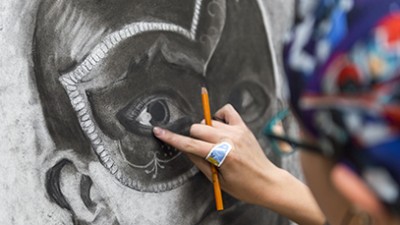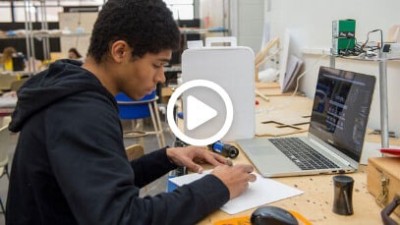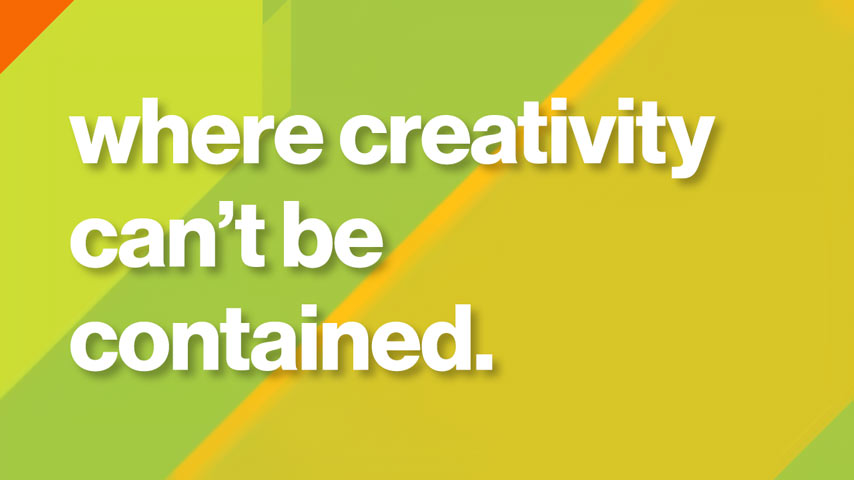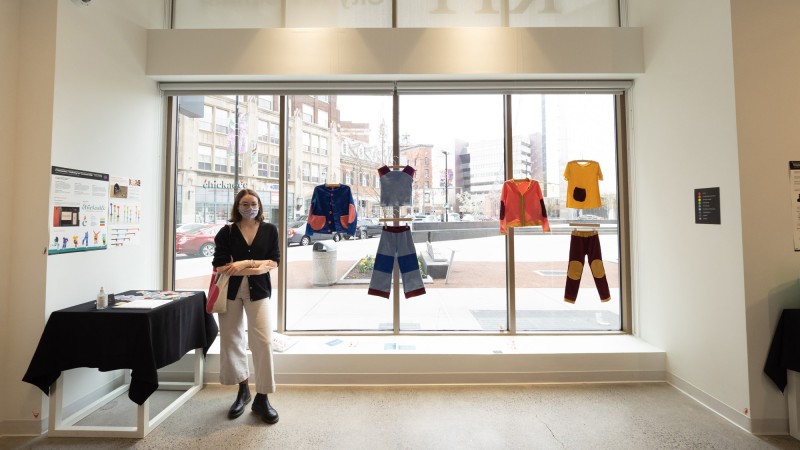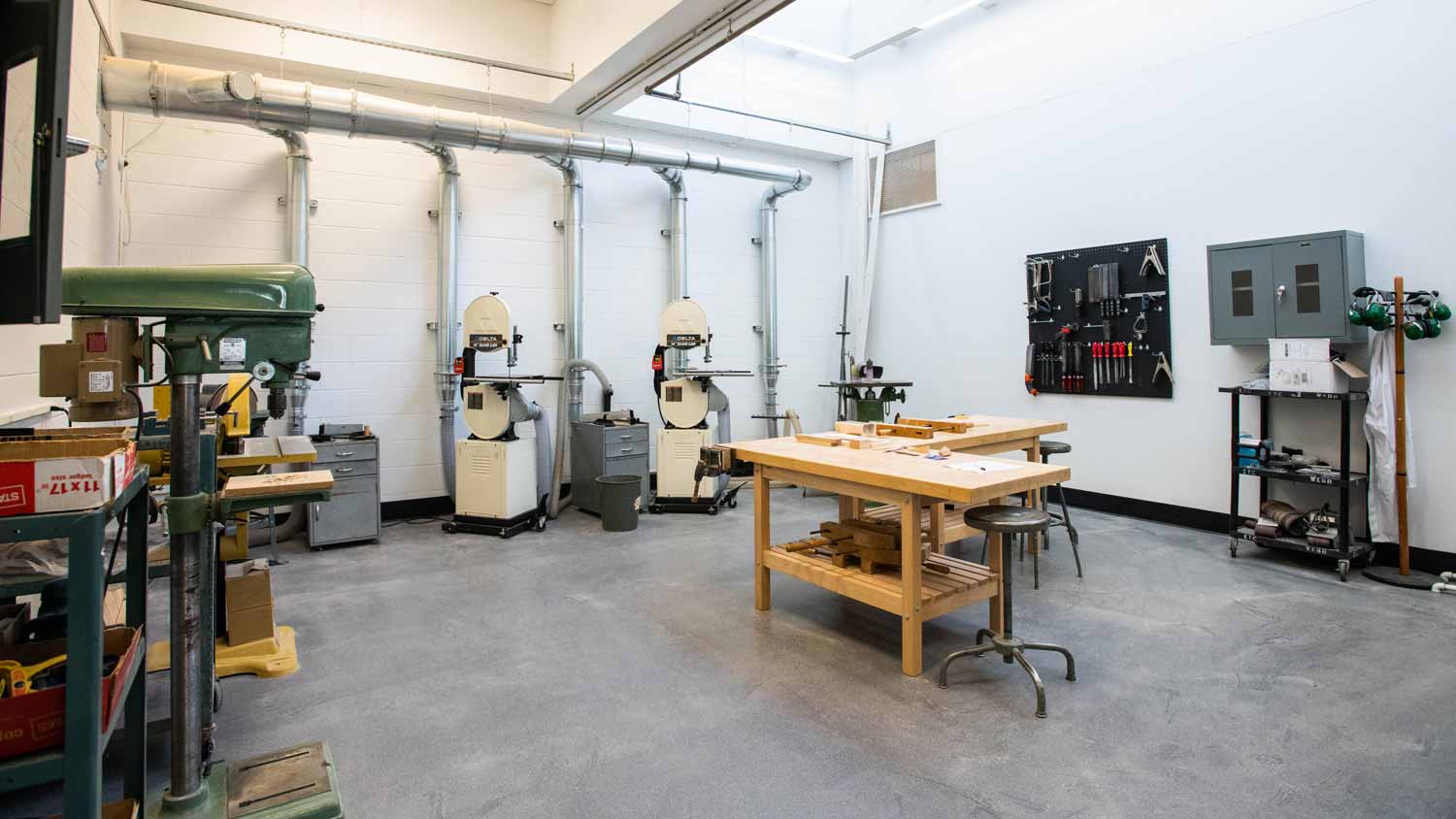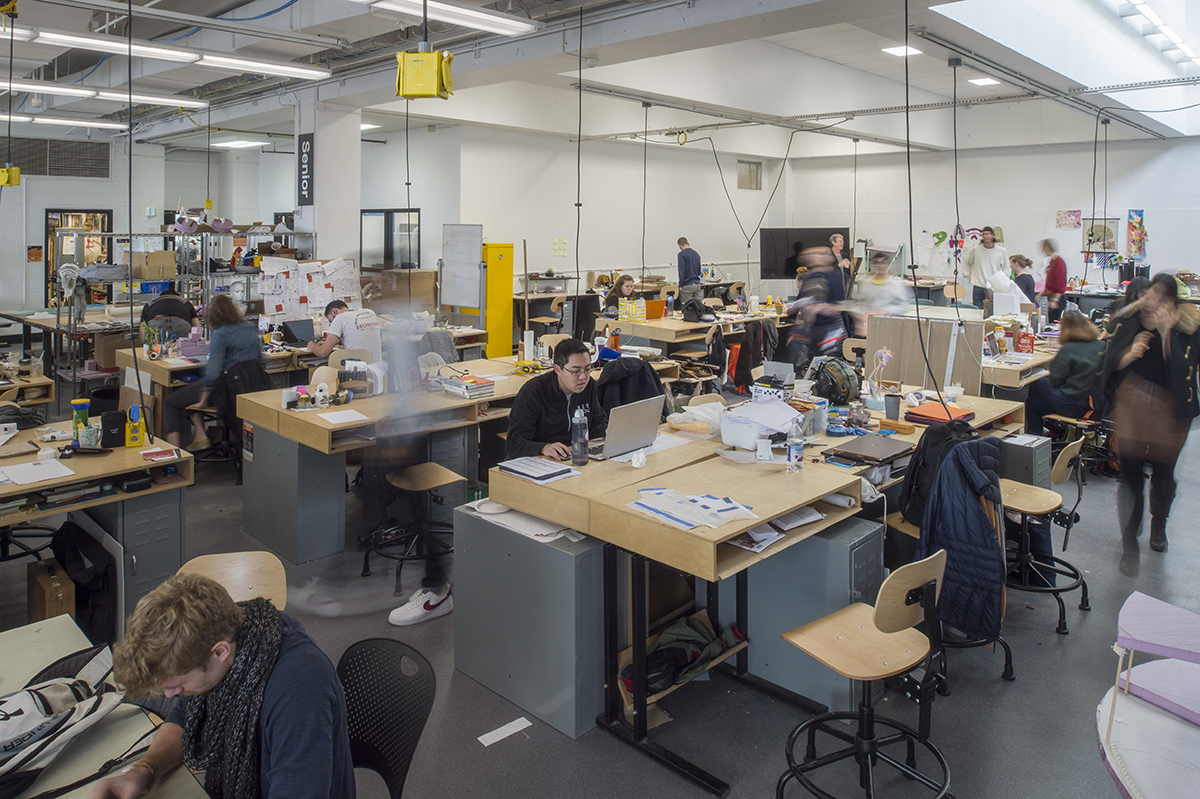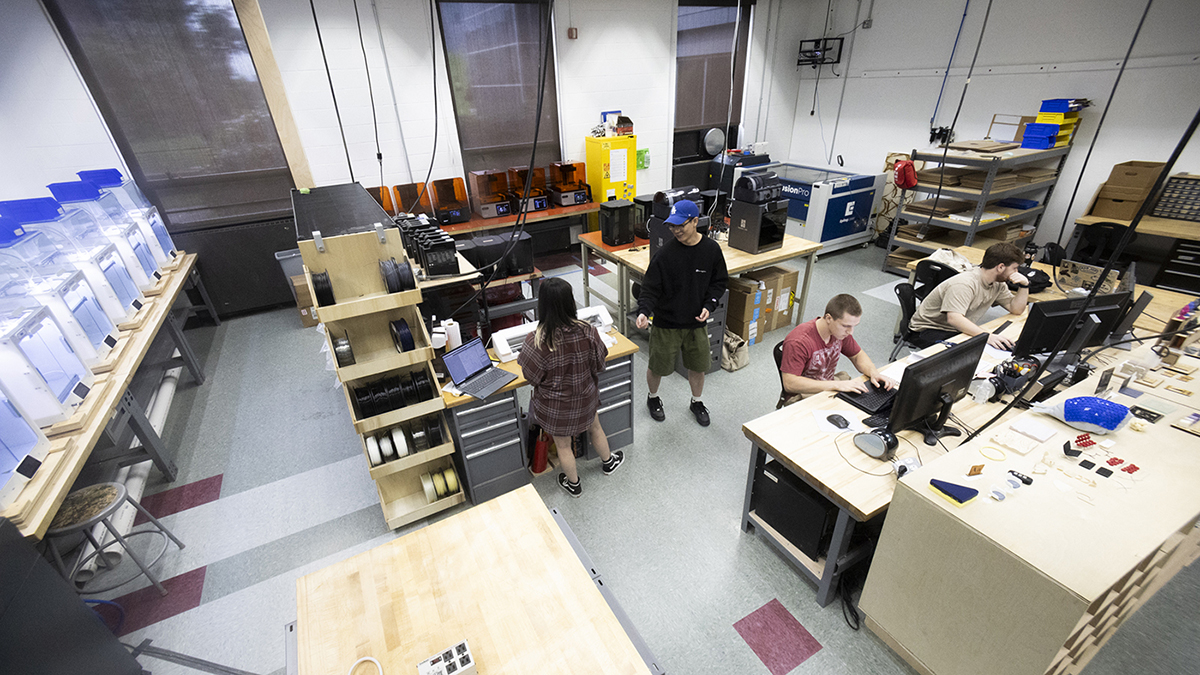Industrial Design Bachelor of Fine Arts Degree
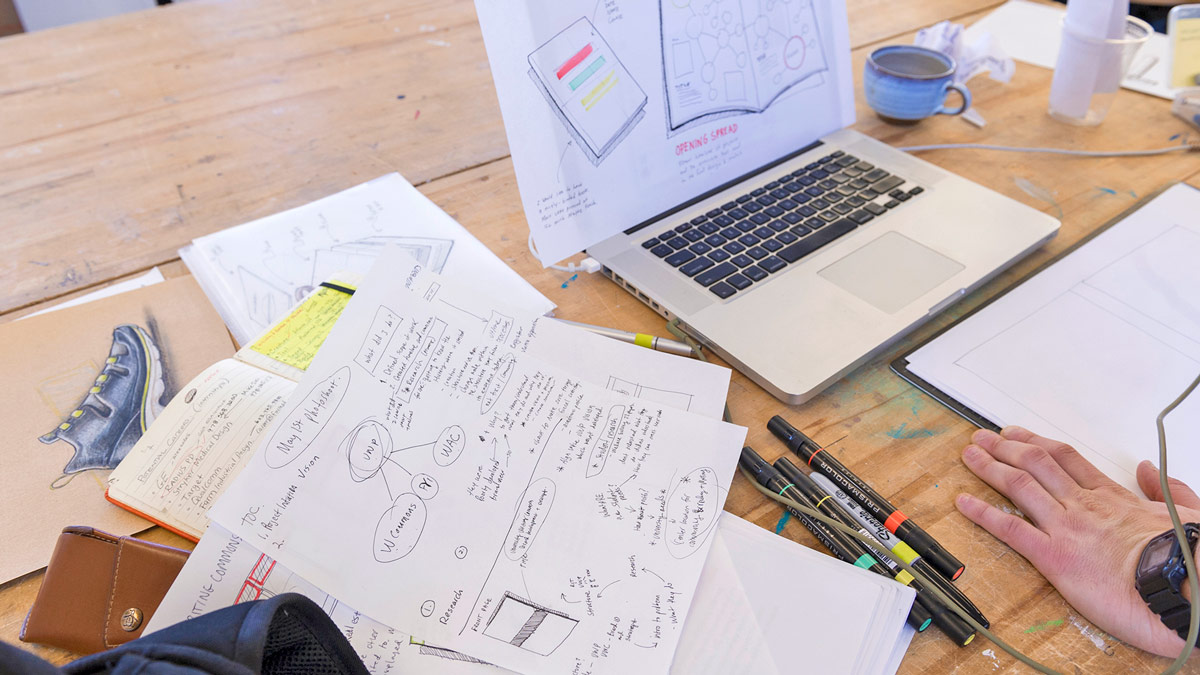
Industrial Design
Bachelor of Fine Arts Degree
- RIT /
- College of Art and Design /
- Academics /
- Industrial Design BFA
Overview for Industrial Design BFA
Why Study Industrial Design at RIT
Accelerated Degree Option: RIT’s 4+2 BFA/M.Arch. enables you to complete your industrial design degree and enter the second year of RIT’s master of architecture degree with advanced standing.
Industry Standard Technology: Our Fab Lab is equipped with 12 3D printers, in addition to laser cutters, CNC routing devices, and other technology, all for you to utilize when completing projects and class assignments.
Gain Real-World Experience: Six designs from Metaproject, the industrial design senior project, are currently in production at various companies.
Award Winning: RIT's School of Design, which houses the industrial design major, is ranked among the best, with Business Week naming it one of the top 10 design schools in the country.
From athletic wear and home goods to stereo systems and medical devices, there are a variety of industries that RIT’s industrial Design prepares you for. Learn how to create and develop inventive products for both consumers and manufacturers in an industry of interest to you.
What is Industrial Design?
Industrial design is a field of design that focuses on the creation of products, systems, and services that are both aesthetically pleasing and functional. It involves the process of designing and developing the appearance, ergonomics, usability, and user experience of various products and objects that are mass-produced for mass consumption.
Industrial designers work to improve the functionality, usability, and visual appeal of products across a wide range of industries, including consumer electronics, furniture, automobiles, appliances, medical devices, and more. They collaborate with engineers, marketers, and manufacturers to create products that meet the needs and preferences of consumers while also considering factors such as cost, sustainability, and manufacturing feasibility.
RIT’s BFA in Industrial Design Courses
RIT's industrial design BFA gives you the knowledge and skills needed to succeed as an industrial product designer and produce products used by factories, businesses, and everyday people.
This industrial product design degree blends technical instruction with studio assignments. You will develop the aesthetic sensitivity, technical competence, and the analytical thinking needed to improve the user experience and design products that meet human needs.
The industrial design degree integrates major courses in package, exhibit, and furniture design. In addition to a mix of studio and open electives, the liberal arts, and art history electives. Bring your conceptual ideas to life in product design courses by developing your technical 2D communications skills and 3D prototyping ability, then learn how to formally move your ideas and products to the marketplace. These industrial design courses incorporate developing expertise in other areas like:
- Computer skills
- Design perspectives
- Career preparation
You will also be exposed to the related areas of:
- Photography
- Engineering
- Information technology
Furthering Your Education in Industrial Design
Combined Accelerated Bachelor’s/Master’s Degrees
Today’s careers require advanced degrees grounded in real-world experience. RIT’s Combined Accelerated Bachelor’s/Master’s Degrees enable you to earn both a bachelor’s and a master’s degree in as little as five years of study, all while gaining the valuable hands-on experience that comes from co-ops, internships, research, study abroad, and more.
- 4+2 BFA/M.Arch. Pathway: A BFA degree takes four years to complete and an M.Arch. degree typically takes an additional three to four years. In RIT’s 4+2 BFA/M.Arch. Pathway, you’ll complete a BFA in industrial design or interior design and then enter the second year of RIT’s NAAB-accredited master of architecture degree with advanced standing. Learn how this accelerated pathway enables you to earn a BFA and an M.Arch. degree in as little as six years, saving you time and money.
- +1 MBA: Students who enroll in a qualifying undergraduate degree have the opportunity to add an MBA to their bachelor’s degree after their first year of study, depending on their program. Learn how the +1 MBA can accelerate your learning and position you for success.
Professional Organizations
The School of Design maintains memberships in a variety of professional organizations, including Industrial Designers Society of America, ACM Siggraph, Society of Environmental Graphic Designers, American Society of Interior Designers, American Institute of Architects, ICOGRADA, American Institute of Graphic Arts, and International Interior Design Association.
-
Next Steps to Enroll
Accept your offer of admission and take the next steps toward becoming an RIT Tiger.
Careers and Experiential Learning
Typical Job Titles
| Creative Director | Creative Designer | Entrepreneur |
| Ergonomist | Ethnographer | Industrial Designer |
| Product Designer | Researcher | Softgoods Designer |
| Structural Designer | User Experience (UX) Designer |
Industries
-
Consumer Packaged Goods
-
Design
-
Fashion
-
Manufacturing
Cooperative Education and Internships
What’s different about an RIT education? It’s the career experience you gain by completing cooperative education and internships with top companies in every single industry. You’ll earn more than a degree. You’ll gain real-world career experience that sets you apart. It’s exposure–early and often–to a variety of professional work environments, career paths, and industries.
Co-ops and internships take your knowledge and turn it into know-how. Your art and design co-ops will provide hands-on experience that enables you to apply your artistic capabilities in dynamic professional settings while you make valuable connections between classwork and real-world applications.
Cooperative education, internships, and other experiential learning opportunities are strongly encouraged for students in the BFA in industrial design.
Creative Industry Days
Connect with Design Industry Leaders
RIT’s Office of Career Services and Cooperative Education hosts Creative Industry Days, which connects students majoring in art, design, film and animation, photography, and select computing majors with companies, organizations, creative agencies, design firms, and more. Creative Industry Days are a series of events that allow you to network with company representatives and interview directly for open co-op and full-time employment positions.
Featured Work and Profiles
-
German Design Fellowship
Daeya Shealy '21 (Industrial Design) earned a Congress-Bundestag Youth Exchange for Young Professionals fellowship to study and work as a designer in Germany for one year.
Read More about German Design Fellowship -
Medical Device Designs
RIT students in the Industrial Design (BFA and MFA) and Graphic Design programs showcased the power of industry partnership as they worked with medical technology company Stryker to design home...
Read More about Medical Device Designs -
Mobile Kitchen Design
A multidisciplinary team of RIT Interior Design and Industrial Design students designed the Mobile Kitchen, which can be easily transformed for users with different needs and abilities. They exhibited...
Read More about Mobile Kitchen Design -
Lamp Design
Lori Resch A lamp that allows for several different lighting conditions was designed by Lori Resch, lecturer of industrial design, during the Vignelli Center for Design Studies’ Summer Design Workshop. Whether a...
Read More about Lamp Design -
Award-winning vessels
Fabiano Sarra Three of the five placements in the Philadelphia Museum of Art Collab Student Design Competition were claimed by industrial design students who created a glass perfume bottle, ceramic water filter and...
Read More about Award-winning vessels -
School of Design Reel
Samples of work from each BFA program in RIT's School of Design — 3D digital design, graphic design, industrial design, interior design and new media design.
Read More about School of Design Reel
Curriculum for 2024-2025 for Industrial Design BFA
Current Students: See Curriculum Requirements
Industrial Design, BFA degree, typical course sequence
| Course | Sem. Cr. Hrs. | |
|---|---|---|
| First Year | ||
| ARTH-1## | Any 100-level ARTH course (General Education-Artistic Perspective) |
3 |
| ARTH-1## | Any 100-level ARTH course (General Education-Global Perspective) |
3 |
| FDTN-111 | Drawing I |
3 |
This course is an introduction to the visualization of form, thought, and expression through the drawing process and is the first of two sequential courses that are the foundation of the drawing curriculum in the College of Art and Design. Concepts are introduced by lectures, discussions, and demonstrations which are designed to provide a broad introductory experience. Students will experiment with a wide variety of media, tools, techniques and subjects to develop drawing and problem-solving skills related to form and composition. The focus of the course is to provide awareness of the full range of ways in which drawing is used as a tool for both self-expression and communication. **Fee: A materials fee is required for this course, and an additional course fee applied via student account** Studio 6 (Fall or Spring). | ||
| FDTN-121 | 2D Design I |
3 |
This course is an introduction to the basic elements and principles of two-dimensional design and is foundational to the College of Art and Design curriculum. The focus of this course is the development of visual and verbal vocabularies as a means of exploring and understanding two-dimensional design. Students will engage with a wide variety of media, tools, and techniques to develop skills while delving into the theoretical and experimentational processes of contemporary art and design. The exploration of historical and cultural themes and concepts intertwined with aspects of personal interpretation and experience will be included in the curriculum. **Fee: A materials fee is required for this course, and an additional course fee applied via student account** Studio 6 (Fall or Spring). | ||
| FDTN-131 | 3D Design I |
3 |
This course presents a progressive study in terminology, visual principles, exploration, concept generation, process, and techniques of three-dimensional design and is foundational to the College of Art and Design curriculum. Using hands-on problem solving, student will develop an informed understanding of the three-dimensional form and space with an emphasis on the elements and principles of visual design and their function as the building blocks and guidelines for ordering a three-dimensional composition. A heightened awareness of form and space will be developed through lecture, assigned projects, and critiques. Students will also develop a personal awareness of problem seeking and solving, experimentation and critical analysis. **Fee: A materials fee is required for this course, and an additional course fee applied via student account** Studio 6 (Fall or Spring). | ||
| Choose one of the following: | 3 |
|
| FDTN-122 | 2D Design II |
|
This course is the second part of the sequential two-dimensional design curriculum within the College of Art and Design. This course builds on the broad introductory experiences in 2D I; students will expand their visual and verbal vocabulary while exploring advanced design concepts through interdisciplinary activities, practices, and exploration. The themes and concepts explored in this course are intertwined with aspects of personal interpretation and experience alongside historical and cultural themes. **Fee: A materials fee is required for this course, and an additional course fee applied via student account** (Prerequisites: FDTN-121 or equivalent course.) Studio 6 (Fall or Spring). | ||
| FDTN-222 | 2D Design II Workshop: Topic |
|
This workshop provides students with the opportunity to learn more about 2D compositions within a more open and experimental approach while still covering the core foundational 2D design II concepts. Different topics may be taken in the same semester, but unique topics may only be taken once. Material and conceptual focus will be determined by the faculty proposing each unique topic. (Prerequisites: FDTN-121 or equivalent course.) Studio 6 (Spring). | ||
| Choose one of the following: | 3 |
|
| FDTN-132 | 3D Design II |
|
This course is the second course in the three-dimensional design curriculum and is foundational to the College of Art and Design education. The focus of the course is on composing three-dimensional form and its relationship to space. Students will build on their prior term experiences, which include the introduction to three-dimensional principles, materials, and building processes. Students will develop the sophisticated skill of conceptualization. More advanced problems will be assigned, and students will have the opportunity to explore a wide range of material and process possibilities for their resolution. A heightened awareness of idea development and design research will be explored. Inclusion of 21st century themes in the arts of social cultural and community. **Fee: A materials fee is required for this course, and an additional course fee applied via student account** (Prerequisites: FDTN-131 or equivalent course.) Studio 6 (Fall or Spring). | ||
| FDTN-232 | 3D Design II Workshop: Topic |
|
This workshop provides students with the opportunity to learn more about 3D compositions within a more open and experimental realm while still covering the core Foundation concepts. Different topics may be taken in the same semester. Topics may only be taken once. The focus is on composing three-dimensional form and its
relationship to space. Material exposure will be determined by the topic’s instructor. (Prerequisites: FDTN-131 or equivalent course.) Studio 6 (Spring). | ||
| IDDE-102 | Design Drawing |
3 |
This course will introduce students to drawing objects and three-dimensional space. Students will use the basics of perspective sketching, developing grids and mechanical perspective and orthogonal views. Students learn to depict various materials such as glass, metals, plastics, fabrics, wood, and other natural materials consistent with professional standards. (Prerequisites: FDTN-111 or equivalent course.) Studio 6 (Spring). | ||
| YOPS-10 | RIT 365: RIT Connections |
0 |
RIT 365 students participate in experiential learning opportunities designed to launch them into their career at RIT, support them in making multiple and varied connections across the university, and immerse them in processes of competency development. Students will plan for and reflect on their first-year experiences, receive feedback, and develop a personal plan for future action in order to develop foundational self-awareness and recognize broad-based professional competencies. (This class is restricted to incoming 1st year or global campus students.) Lecture 1 (Fall, Spring). | ||
General Education – First-Year Writing (WI) |
3 | |
| Choose one of the following: | 3 |
|
General Education – Natural Science Inquiry Perspective |
||
General Education – Scientific Principles Perspective |
||
General Education – Mathematical Perspective A |
||
| Second Year | ||
| IDDE-201 | Sophomore ID Studio I |
3 |
This course will focus on experimentation and discovery through the exploration of creative problem solving techniques. Students will explore the dynamics between objects and the user’s senses, emotions, and expressed needs. Using drawing, sketch-modeling and basic shop skills, students will discover the wide choice of materials industrial designers use to further develop their projects. Concepts of recycling and reuse are introduced along with philosophical design approaches, and historical examples. Emphasis will be placed on the improvement of craft in the development of projects and on clarity and professionalism in practice. (Prerequisites: IDDE-102 or equivalent course.) Studio 6 (Fall). | ||
| IDDE-202 | Sophomore ID Studio II |
3 |
In this course, design projects are conceived as the result of close contact between students and real-world projects commonly found in the manufacturing sector. Students research a specific manufacturing entity in order to understand its capabilities. Research will be conducted in the field and shared with the class to enhance the understanding of the realities associated with production. Students will be challenged to improve their ability to define problems, generate and promote concepts, evaluate their work and offer refinements of solutions. They will learn to derive inspiration from the material world and marketplace while simultaneously bringing inspiration to them. (Prerequisites: IDDE-201 or equivalent course.) Studio 6 (Spring). | ||
| IDDE-206 | ID Form |
3 |
This course will emphasize the cognitive and technical skills necessary to manipulate material for the accurate three-dimensional communication of design intent. Projects focus on understanding the relationship of materials, manufacturing processes, products and the user. Special emphasis is placed on using non-toxic materials. (Prerequisites: FDTN-132 or FDTN-232 or equivalent course.) Studio 6 (Fall). | ||
| IDDE-207 | ID Digital Drawing |
3 |
This course will develop more advanced analog and digital visualization techniques, while expanding on graphic and three-dimensional components needed to create presentations and the workflows to achieve them. Students will learn various types of digital techniques using vector and raster-based software applications, and a variety of input and output devices for the creation of professional-level output. (Prerequisites: IDDE-102 or equivalent course.) Studio 6 (Fall). | ||
| IDDE-211 | Human Factors Applications |
3 |
This course will emphasize human characteristics, capabilities and limitations as the primary design criteria in understanding, designing and analyzing systems, displays, controls, tools, and workstations. (Prerequisites: IDDE-201 or equivalent course.) Lecture 3 (Spring). | ||
| IDDE-212 | Integrated Computer-Aided Design |
3 |
Students will develop the skills needed to effectively develop and communicate design concepts graphically, digitally and three-dimensionally, consistent with professional industrial design practice standards. Emphasis will be placed on the development, integration and application of computer aided design skills throughout the assignments, utilizing the relationship of analog and digital mediums as a means of enriching the design process. (Prerequisites: IDDE-201 or equivalent course.) Studio 6 (Spring). | ||
| IDDE-221 | History of Industrial Design |
3 |
This course explores the history of the industrial design profession as it evolved in response to the Industrial Revolution and industry’s need for standardized approaches to aesthetics and design for the end user. Significant designers and their work are reviewed in the context of the economics and politics of the times. This course also surveys the history of modern furniture design from the late 19th Century to the present, including important design movements, individual designers and their significant furniture designs. Lecture 3 (Fall). | ||
General Education – Ethical Perspective |
3 | |
General Education – Social Perspective |
3 | |
General Education – Elective |
3 | |
| Third Year | ||
| IDDE-301 | Junior ID Studio I |
3 |
Students will explore the benefits and challenges of working with a design team to address a complex product, problem, or system. Students will explore group dynamics, creativity in design teams, as well as the nature of complex problems and the various methods required to solve them. (Prerequisites: IDDE-202 and IDDE-211 and IDDE-212 or equivalent courses.) Studio 6 (Fall). | ||
| IDDE-302 | Junior ID Studio II |
3 |
This course will highlight the application of design methods and processes through projects that focus on deepening the students’ problem-solving skills, studio skills (two- and three-dimensional sketching, drawing, CAD), shop skills (modelmaking) and presentation skills. Emphasis will be placed on collaborating with multidisciplinary partners outside the industrial design program, and/or, when circumstances allow, with external resources such as clients or project sponsors. (Prerequisites: IDDE-301 or equivalent course.) Studio 6 (Spring). | ||
| IDDE-306 | Materials and Processes |
3 |
This course will help students develop a theoretical understanding and technical competency in materials and processes applied in industrial design practice. Discussions and assignments focus on the relationship of manufacturing processes and materials selection to design intent. (Prerequisites: IDDE-202 or equivalent course.) Lecture 3 (Fall). | ||
| IDDE-307 | Graphic Tactics |
3 |
This course provides industrial design students with an introduction to the design and application of graphic elements to objects and environments. (Prerequisites: IDDE-202 or equivalent course.) Studio 6 (Fall). | ||
| IDDE-311 | ID Career Planning (WI-PR) |
3 |
This course will introduce students to the business practice of industrial design. Field trips, guest lecturers, and discussion of current trends help students understand the various employment opportunities for the design professional. The course will cover the mechanics of job searching; creating a résumé, cover letter structure and portfolio, and interviewing to help prepare for design internships, co-ops, and entry-level positions. (Prerequisites: IDDE-301 or equivalent course and completion of First Year Writing (FYW) requirement.) Lecture 3 (Spring). | ||
Open Electives |
6 | |
General Education – Immersion 1 (WI), 2 |
6 | |
Art History Elective* |
3 | |
| Fourth Year | ||
| IDDE-406 | Professional Practice |
3 |
The course will take an in-depth look at business of design, and employment as a design professional for students beginning the job search. Students will refine their résumé, cover letter, and portfolio developed in Career Planning as they identify career options through research and networking with professionals in their chosen area. Students will explore the financial and legal aspects of employment in the design business. (Prerequisites: IDDE-302 or equivalent course.) Lecture 3 (Fall). | ||
| IDDE-407 | ID Senior Capstone I |
3 |
This is the first course in a two-course sequence in which the industrial design senior capstone project is developed. The course will focus on establishing content, planning, scheduling, and research of a faculty approved project that explores the social elements of design either in a collaborative design process, or in context of the broader social impact of design decisions. Students will complete the early stages of capstone development including ideation, concept refinement and evaluation. Final design proposals will be implemented in Capstone II. (Prerequisites: IDDE-302 or equivalent course.) Lab 3, Lecture 2 (Fall). | ||
| IDDE-408 | ID Senior Capstone II |
3 |
This is the second course in a two-course sequence in which the industrial design capstone project is completed. Students will finalize their design solution, publicly disseminate their work, and create a written document that addresses how the theories and methods used in the project have an impact on the current and future state of design in society. (Prerequisites: IDDE-407 or equivalent course.) Lab 3, Lecture 2 (Fall or Spring). | ||
| IDDE-501 | Senior ID Studio I |
3 |
This course will explore the application of design methods and skills to projects addressing large-community and global problems requiring team-based, trans-disciplinary collaborations. (Prerequisites: IDDE-302 or equivalent course.) Studio 5 (Fall or Spring). | ||
| IDDE-502 | Senior ID Studio II |
3 |
Senior ID Studio II applies design methods and skills to advanced level projects addressing users with unique, non-traditional needs requiring multi-disciplinary collaborations. Project development will emulate processes used in professional industrial design practice. (Prerequisites: IDDE-501 or equivalent course.) Studio 6 (Spring). | ||
Open Electives |
9 | |
General Education - Elective |
3 | |
General Education – Immersion 3 |
3 | |
| Total Semester Credit Hours | 120 |
|
Please see General Education Curriculum (GE) for more information.
(WI) Refers to a writing intensive course within the major.
Please see Wellness Education Requirement for more information. Students completing bachelor's degrees are required to complete two different Wellness courses.
* Art History electives are non-studio courses searchable in SIS with the Art History attribute of ARTH; and are 200 level or above.
Combined Accelerated Bachelor’s/Master’s Degrees
The industrial design BFA program is part of a 4+2 BFA/M.Arch. Pathway. Learn how this accelerated pathway enables you to earn a BFA and an M.Arch. degree in as little as six years.
Admissions and Financial Aid
First-Year Admission
First-year applicants are expected to demonstrate a strong academic background that includes:
- 4 years of English
- 3 years of social studies and/or history
- 3-4 years of mathematics
- 2-3 years of science
- Studio art experience and a portfolio of original artwork are required. View Portfolio Requirements for more information.
Transfer Admission
Transfer applicants should meet these minimum degree-specific requirements:
- Studio art or design experience and a portfolio of original artwork are required. View Portfolio Requirements for more information.
Financial Aid and Scholarships
100% of all incoming first-year and transfer students receive aid.
RIT’s personalized and comprehensive financial aid program includes scholarships, grants, loans, and campus employment programs. When all these are put to work, your actual cost may be much lower than the published estimated cost of attendance.
Learn more about financial aid and scholarships
Related News
-
April 21, 2025

RIT alumni innovators to speak at Futurists Symposium on April 25
The annual Futurists Symposium, featuring a unique collection of the university’s alumni innovators, spotlights panelists highlighting their expertise on a variety of topics. The event begins at 4 p.m. Friday in Ingle Auditorium.
-
March 10, 2025

Inequity and suffering bother me, says design pioneer who has changed lives
The New Straits Times speaks to Patricia Moore '74 (industrial design).
-
January 31, 2025

Faculty member helps redesign ‘Doomsday Clock’
Juan Noguera, assistant professor in the School of Design, combined both traditional and modern techniques in the redesign of the infamous clock that made international headlines this week. The body of the clock was printed in RIT’s SHED.
Contact
- Melissa Dawson
- Associate Professor
- School of Design
- College of Art and Design
- 585‑475‑5647
- mdmfaa@rit.edu
School of Design


